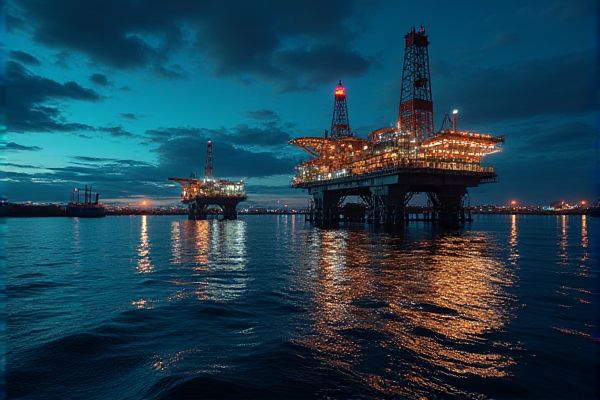
AI technologies enhance exploration and production processes in the oil and gas industry by analyzing vast geological data, which leads to more accurate predictions of oil reserves. Machine learning algorithms optimize drilling operations, ensuring efficient resource extraction while minimizing costs and environmental impact. Predictive maintenance powered by AI reduces equipment downtime significantly, allowing for smoother operations and increased safety within hazardous environments. Advanced analytics also improve decision-making, enabling companies to adapt quickly to market fluctuations and operational challenges.
AI usage in oil and gas industry
Predictive Maintenance
Predictive maintenance in the oil and gas industry utilizes AI to forecast equipment failures before they occur, enhancing operational efficiency. Companies like Shell leverage machine learning algorithms to analyze real-time data from sensors, reducing unplanned downtime. By minimizing maintenance costs, firms can improve profitability and extend the lifespan of critical assets. This approach not only promotes safety but also supports sustainable practices by optimizing resource usage.
Reservoir Management
AI technologies in reservoir management can optimize resource extraction by predicting reservoir behavior under various conditions. Machine learning algorithms analyze geological and operational data to enhance decision-making processes. Companies such as Chevron utilize AI to improve drilling efficiency and reduce costs. This strategic application of AI can lead to increased production rates and minimized environmental impact.
Drilling Optimization
Drilling optimization in the oil and gas industry can significantly enhance operational efficiency. By employing AI algorithms, companies can analyze drilling data in real-time to predict and mitigate potential issues. For instance, using advanced machine learning techniques, operators can optimize drilling parameters to reduce costs and time. This technology has the potential to improve decision-making processes, leading to increased safety and reduced environmental impact.
Seismic Data Interpretation
AI can enhance seismic data interpretation in the oil and gas industry by improving the accuracy of subsurface imaging. Machine learning algorithms can analyze vast amounts of geological data, identifying patterns that may not be visible to human analysts. Companies like BP have begun implementing AI-driven models to optimize exploration and production strategies. This presents the possibility of reducing costs and increasing efficiency in resource extraction.
Supply Chain Optimization
AI can significantly enhance supply chain optimization in the oil and gas industry by analyzing large volumes of data to predict demand fluctuations and streamline operations. For example, predictive maintenance powered by AI algorithms can reduce equipment downtime and maintenance costs. This technology also allows companies to efficiently allocate resources, leading to improved inventory management and reduced waste. Leveraging AI tools can provide organizations like ExxonMobil a competitive edge in an increasingly volatile market.
Health, Safety, and Environment (HSE)
AI technologies can significantly enhance Health, Safety, and Environment (HSE) practices in the oil and gas industry by predicting potential hazards. For example, machine learning algorithms can analyze historical incident data to identify patterns, allowing companies like BP to implement proactive safety measures. Automated monitoring systems can provide real-time risk assessments, helping to reduce accidents on site. The integration of AI could lead to improved compliance with regulatory standards and overall operational efficiency.
Energy Efficiency
AI can enhance energy efficiency in the oil and gas industry by optimizing resource allocation and reducing waste. For example, predictive maintenance powered by AI analytics can prevent equipment failures, leading to lower operational costs. By analyzing data more effectively, companies like Shell can identify patterns that improve drilling operations and minimize energy consumption. Implementing AI solutions presents a significant opportunity for firms to boost their sustainability efforts and reduce their environmental footprint.
Workforce Automation
AI implementation in the oil and gas industry can enhance operational efficiency and reduce costs. For example, predictive maintenance algorithms can analyze equipment data to minimize downtime. Workforce automation capabilities allow companies like ExxonMobil to streamline processes and allocate human resources more effectively. This integration of AI technologies may lead to increased productivity and improved safety standards in the field.
Asset Monitoring
AI technologies can enhance asset monitoring in the oil and gas industry by predicting equipment failures and optimizing maintenance schedules. For example, companies like BP have implemented AI-driven predictive analytics to improve efficiency and reduce downtime in their operations. This capability allows for real-time data analysis, leading to more informed decision-making and potentially significant cost savings. The adoption of AI in this context presents opportunities for increased operational efficiency and risk management.
Risk Management
AI can enhance risk management in the oil and gas industry by analyzing large datasets to predict equipment failures and safety hazards. For instance, machine learning algorithms can identify patterns in historical data from companies like BP to forecast potential issues in drilling operations. This predictive capability allows organizations to implement preventive measures, reducing downtime and operational costs. By leveraging AI, the industry can improve safety protocols, which may lead to a more resilient and efficient operational framework.
 techknowy.com
techknowy.com